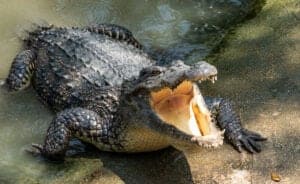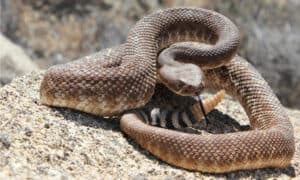The “Bluegrass State” of Kentucky is known for its green grass pastures, thoroughbred horses, and many wild animals like black bears and mountain lions. But what about its snakes? Well, Kentucky provides a natural home for at least 34 different types of snakes! Four of its snakes are venomous, but only two species are rattlesnakes.
Let’s take a closer look at the two types of rattlesnakes in Kentucky and learn how to identify them and where they can be found.
1. Timber Rattlesnake (Crotalus horridus)
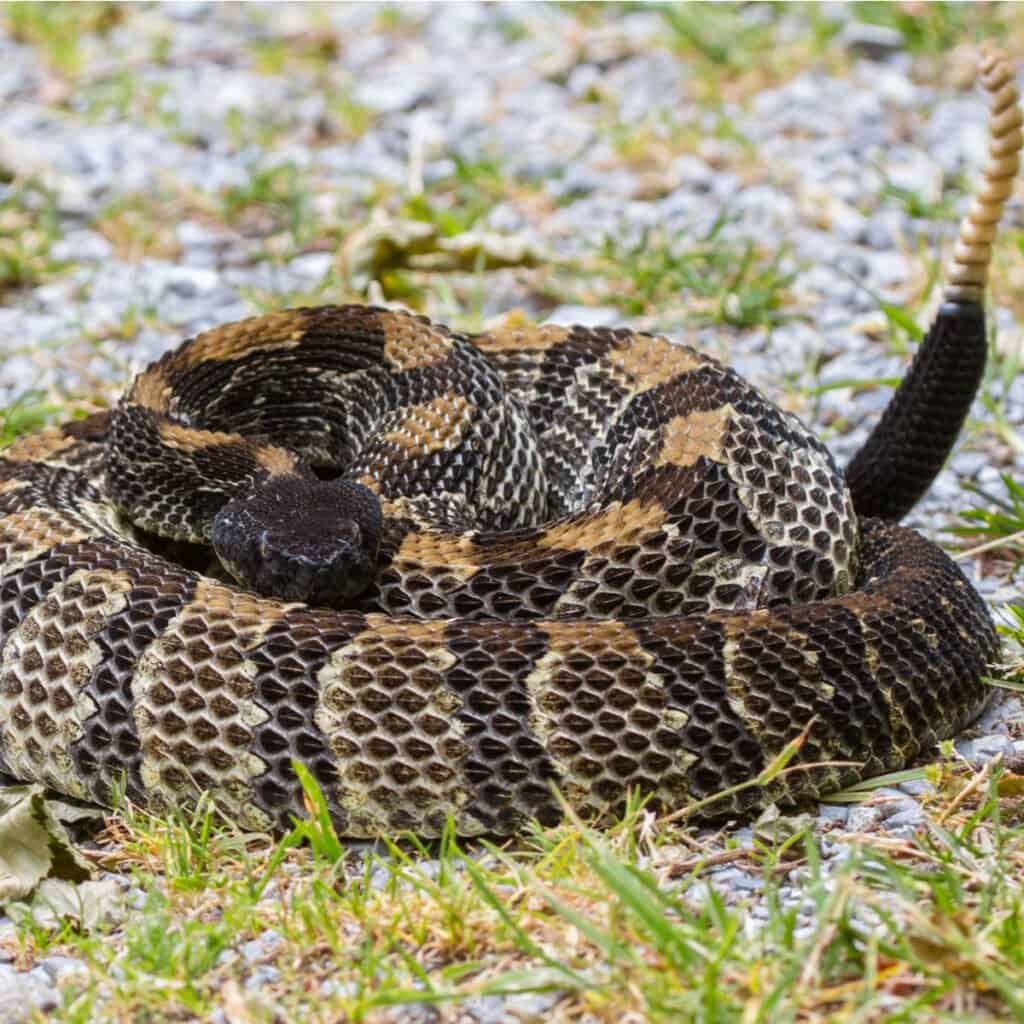
Although highly venomous, timber rattlesnakes rarely strike without warning.
©Frode Jacobsen/Shutterstock.com
| Timber Rattlesnake | |
|---|---|
| Range | Scattered across Kentucky in dense forests & rocky outcrops |
| Length | 30-60 inches |
The largest venomous snake in Kentucky is the timber rattlesnake. It is also the most venomous snake in the state with a very dangerous bite. However, timber rattlesnakes are not aggressive snakes. In fact, most of the time they won’t even rattle unless they are harassed. If they are disturbed, these snakes tend to rattle loudly for some time before ever attempting to strike.
Long ago timber rattlesnakes lived all across Kentucky, but today they are listed as a “Species of Greatest Conservation Need” by the Kentucky Department of Fish and Wildlife Resources. Now they only live in areas with dense forests and rocky outcrops. This means that you likely will never see one of these snakes in the wild unless you happen to be out camping or hiking.
Winters in Kentucky is much too cold for timber rattlesnakes, so they brumate (similar to hibernation) in dens shared with copperheads and other species; often using the same dens for generations. From springtime through the fall, these snakes may be seen on the south- or southwest-facing rocky slopes, bluffs, and ridges as they warm themselves in the sun.
Even if you do encounter a timber rattlesnake, you may not see it at first, because these snakes are secretive and have excellent camouflage. Timber rattlesnakes are large, heavy-bodied snakes with keeled or ridged scales.
Their backs are green, brown, yellow, or gray, with dark chevron or V-shaped crossbands along the length of their long bodies. Some timber rattlesnakes in Kentucky, however, have dark speckling as well, which can make them look almost entirely black. These thick snakes can grow up to 60 inches in length, although they are usually 2.5 – 3.5 feet long.
2. Western Pygmy Rattlesnake (Sistrurus miliarius)
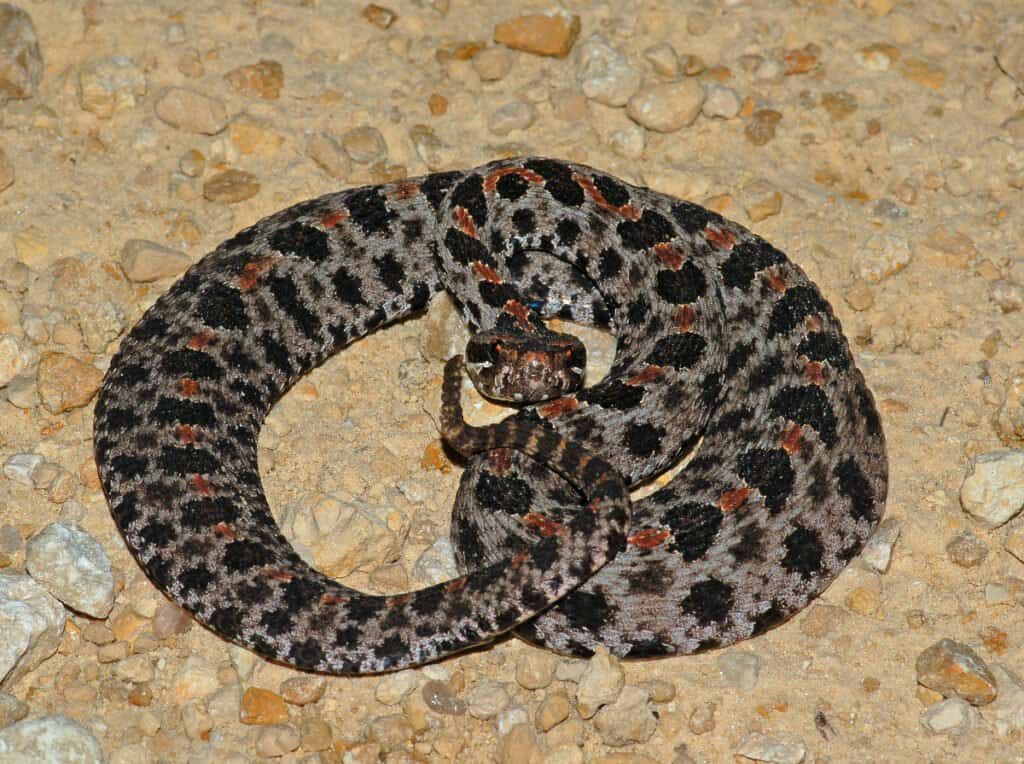
Small and difficult to spot – western pygmy rattlesnakes are incredibly rare in Kentucky
©Gerald A. DeBoer/Shutterstock.com
| Western Pygmy Rattlesnake | |
|---|---|
| Range | The land between the Lakes National Recreational Area |
| Length | 16-24 inches |
Kentucky’s only other rattlesnake, the western pygmy rattlesnake, is extremely rare in the state. In fact, western pygmy rattlesnakes only live in the Land Between the Lakes National Recreational Area. We still do not know a lot about the pygmy rattlesnakes in Kentucky because they are so rarely seen, but in other states, they typically prefer living in swamps or wetlands areas, upland forests, and sometimes sandhills. So, if you decide to go hiking near water, swimming, or fishing in Kentucky, keep an eye out for these snakes.
Like the timber rattlesnake, western pygmy rattlesnakes in Kentucky are considered a “Species of Greatest Conservation Need”, particularly because they live in such a small region. If you are lucky enough to see one of these beautifully patterned snakes, be sure to keep your distance, but report the sighting to the Kentucky Division of Fish and Wildlife Resources so they can keep track of rattlesnake populations.
Western pygmy rattlesnakes are much smaller than timber rattlesnakes, growing only 16-24 inches in length. They have tiny rattles on the ends of their tails, and although they may rattle fiercely, it sounds a lot like buzzing insect.
Their bodies are grayish brown or gray, with dark, oval-shaped spots along their backs and sides. There is a dark stripe from each eye to the back of the jaw, and some pygmy rattlesnakes also have a thin, reddish-brown stripe running along the middle of their backs. Baby western pygmy rattlesnakes look like miniature adults, except that the tips of their tails are bright yellow.
Other Snakes in Kentucky
There are several other snakes in Kentucky that are often misidentified as rattlesnakes. Many of these snakes are nonvenomous, and some of them do not even bite! Here are a few of the “rattlesnake look-a-likes” you might happen to come across in Kentucky.
Water Snakes (Nerodia spp.)
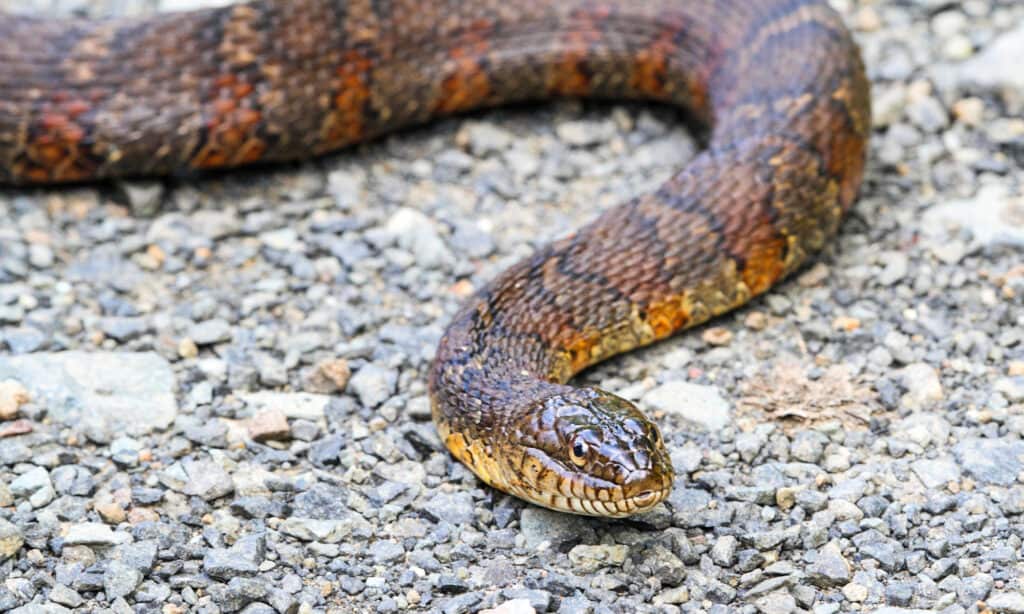
With their similar appearance, water snakes are often mistaken for rattlesnakes in Kentucky.
©Steve Byland/Shutterstock.com
| Water Snakes | |
|---|---|
| Range | In and around bodies of water in Kentucky |
| Length | 24-48 inches |
Kentucky is home to several different species of water snakes:
- Broad-Banded Water Snakes (Nerodia fasciata) —(only in extreme western Kentucky)
- Common or Northern Water Snakes (Nerodia sipedon) — (all across Kentucky)
- Diamond-Backed Water Snakes (Nerodia rhombifer) — (Jackson Purchase and western Kentucky coalfields)
- Plainbelly Water Snakes (Nerodia erythrogaster) — (western Kentucky)
Water snakes in Kentucky grow between 2-4 feet, with brown, reddish brown, black, gray, greenish, or yellowish bodies. Many have gray or dark brown crossbands, spots, or diamond-shaped blotches on their backs, depending on the species.
Like their name, water snakes live in and around permanent bodies of water. They can be found in or near lakes, rivers, streams, and ponds, where they mainly eat fish and amphibians. These snakes are not venomous, but they can be irritable and bite easily if bothered.
Prairie Kingsnake (Lampropeltis calligaster)
| Yellow-Bellied or Prairie Kingsnake | |
|---|---|
| Range | Western Kentucky |
| Length | 24-48 inches |
Found in the western half of Kentucky, prairie kingsnakes are 2-3.5 feet long with brown or brown-gray bodies. Reddish or brown blotches with black outlines run along their backs and along the sides of their bodies.
Although they may look similar to some types of rattlesnakes, these snakes are nonvenomous. One way to tell the difference is that prairie kingsnakes have round, narrow heads, while rattlesnakes have large, triangular-shaped heads that are often twice the width of their necks.
Pine Snake (Pituophis melanoleucus)
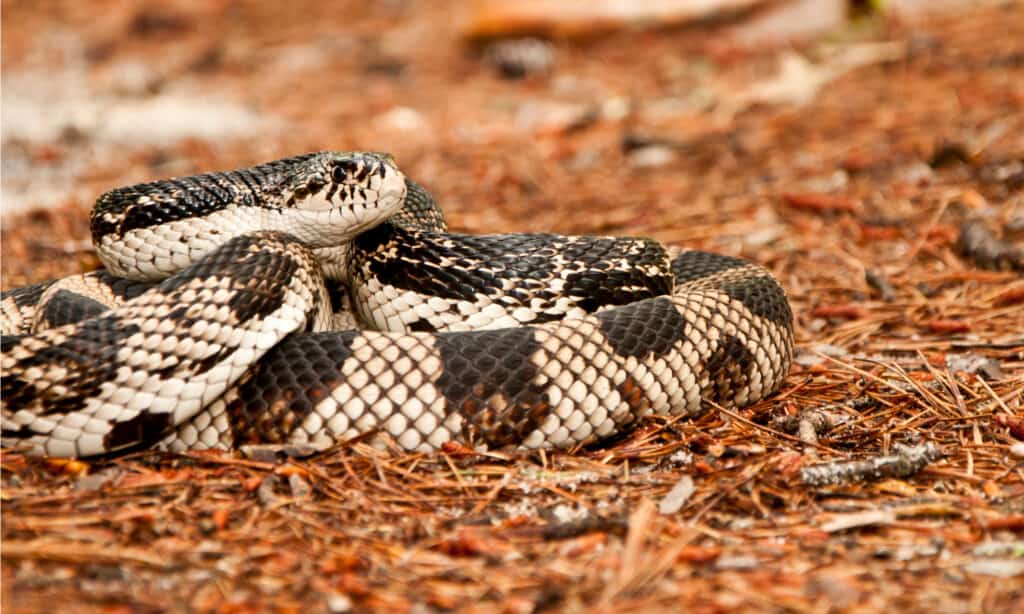
Although similar to rattlesnakes, pine snakes are not venomous.
©Jay Ondreicka/Shutterstock.com
| Pine Snake | |
|---|---|
| Range | South-Central & South-Eastern Kentucky; the Land Between the Lakes National Recreational Area |
| Length | 48-72 inches |
One of the longest and largest snakes in Kentucky is the pine snake. These heavy-bodied snakes can grow up to 6 feet long! They are usually a yellowish, whitish, or tannish color, with large dark or reddish-brown blotches along their backs. They often live in abandoned fields, woodlands, and regions with dry, sandy soil.
In Kentucky, pine snakes live in isolated populations in three main areas: south-central Kentucky, south-eastern Kentucky, and the Land Between the Lakes National Recreational Area. These snakes can be mistaken for a rattlesnake due to their appearance, and because they hiss quite loudly.
However, pine snakes are completely harmless to humans, and are a “Species of Greatest Conservation Need” in Kentucky.
Other Reptiles Found in Kentucky
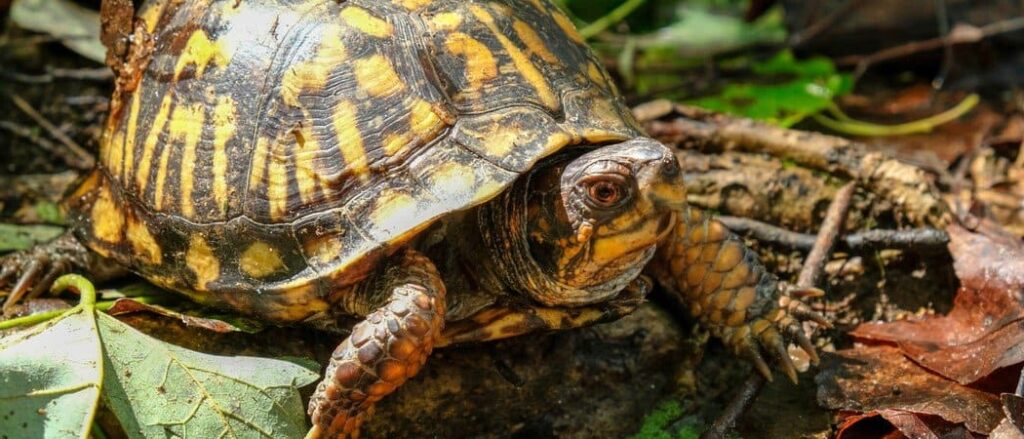
Eastern Box Turtles are a reptile that is often found in Kentucky.
©samray/Shutterstock.com
In addition to a wide variety of snake species, Kentucky is home to a number of other fascinating reptiles. These reptiles can be found throughout the state in a range of settings and come in a variety of sizes, colors, and shapes.
The non-snake reptile species of Kentucky, which includes the spectacular snapping turtle and the rare five-lined skink, is just as deserving of admiration and research as the snake population.
Here are a few other reptiles found in Kentucky that are not snakes:
- Eastern box turtle (Terrapene carolina carolina)
- Common snapping turtle (Chelydra serpentina)
- Red-eared slider (Trachemys scripta elegans)
- Eastern painted turtle (Chrysemys picta)
- Five-lined skink (Plestiodon fasciatus)
- Broadhead skink (Plestiodon laticeps)
The photo featured at the top of this post is © Joe McDonald/Shutterstock.com
Discover the "Monster" Snake 5X Bigger than an Anaconda
Every day A-Z Animals sends out some of the most incredible facts in the world from our free newsletter. Want to discover the 10 most beautiful snakes in the world, a "snake island" where you're never more than 3 feet from danger, or a "monster" snake 5X larger than an anaconda? Then sign up right now and you'll start receiving our daily newsletter absolutely free.
Thank you for reading! Have some feedback for us? Contact the AZ Animals editorial team.



